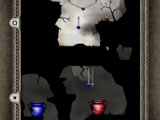Walaber Experiments with Ragdolls and Aerial Skiing
Walaber (Jello Car, Gymast), recently posted videos revealing he’s experimenting with a powered ragdoll. The first video shows a ragdoll with constraint angles controlled via gamepad:
The second video reveals he’s developing the technology for a freestyle/aerial skiing game:
2D Boy Confirms World of Goo Wii Multiplayer
2D Boy has updated their blog with some World of Goo details, including this juicy tidbit:
There were some rumors, so just to confirm: Yes, the Wii version will have multiplayer co-op play in every single level. Additional players can join in or leave at any time. We have not tried (yet) on any child specimens, but I think this will be a very good mode for parents playing with offspring.
World of Goo will be released for PC, Wii, Mac, and Linux sometime later this summer. A pre-order of the game is available now, which includes the first playable chapter of the game. Spend your $20 over at the 2D Boy games page!
Beautiful, Frustrating Puzzle Physics
Obulis is the first PC release from IonFx, a longtime Pocket PC developer. It’s actually the third installment in the series, with the first two titles out on Windows Mobile. Obulis is a puzzle game in the truest, hardcore sense of the word. I hope you like thinking!
Simple Rules
The goal in Obulis is to get the colored balls to their matching pots. To do this, you need to manipulate their physical motion. You can only do this in one way, by cutting rope. You can snip any of the ropes in the game, which usually hold the balls up, but also act as a way to time the release of launchers. The controls allow you to select and destroy rope as separate actions, which helps with difficult timing (although, annoying, if you use right-click to cut a rope you still have to select it first–it should be one click).
Inelastic Physics
The physics engine in Obulis is wholly inelastic, which support many of the puzzle designs. When a ball rolls into another ball, it comes to a complete stop, with the second ball taking on all of its velocity. There is only so much potential energy in each level, so you’ll find yourself re-routing energy through multiple balls. Visualizing the total remaining energy will be key to solving the puzzles.
Cleverness, Timing
My big complaint with true puzzle games is the nature of complexity. In order for a puzzle game to become more difficult, the designer needs to do some really clever stuff. In my mind, the fun of the game should boil down to the player re-discovering the clever solution for themselves. But sometimes it just feels like the level designer is showcasing their cleverness without any consideration for the player. Personally I would enjoy more levels with open-ended setups, where I can fudge the solution (Armadillo Run does this fantastically). Obulis has a much tighter possibility space; most levels must be solved exactly as the designer intended.
The other complaint I have with Obulis is the nature of the timing involved to get the physics right. It’s very annoying to have a realization about what you’re supposed to do, and then have to beat your head against the wall to get the timing correct. Watch the end of the gameplay video for an example of this in action.
Puzzle Gamers Rejoice!
I’m willing to admit that I just don’t have the right state of mind to enjoy a puzzle game like Obulis. The production value is fantastic, and many of the levels are a joy to play, but it’s also an amazing frustration generator. If you have the stomach for that kind of thing, or feel some strange pressure to prove yourself to game designers, then Obulis is very definitely the game for you.
Download Obulis Demo (33.5 MB)
Or visit the Obulis website for more information. The full version costs $19.99 USD.
Related Posts:
Next Page »


 (Rate this game! 43 votes, average: 3.49 out of 5)
(Rate this game! 43 votes, average: 3.49 out of 5)

 My name is Matthew Wegner, and this site is dedicated to physics games.
My name is Matthew Wegner, and this site is dedicated to physics games.